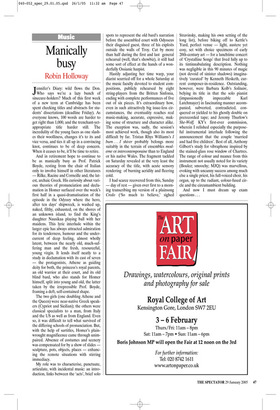Manically busy
Robin Holloway
Jennifer’s Diary: wild flows the Don. Who says we’re a lazy bunch of sinecure-holders? Much of this first week of a new term at Cambridge has been spent checking titles and abstracts for students’ dissertations (deadline Friday). As everyone knows, 100 words are harder to get right than 1,000, and the trenchant-yetappropriate title harder still. The incredulity of the young faces as one slashes their woolliness, changes it’s to its and vice versa, and ties it all up in a convincing knot, continues to be of deep concern. When it ceases to be, it’ll be time to retire.
And in retirement hope to continue to be as manically busy as Prof. Patrick Boyde, resting from the chair of Italian only to involve himself in other literatures — Rilke, Racine and Corneille and, the latest, archaic Greek. His curiosity about various theories of pronunciation and declamation in Homer surfaced over the week’s first half in a quasi-dramatisation of the episode in the Odyssey where the hero, after ten days’ shipwreck, is washed up, naked, filthy, exhausted, on the shores of an unknown island, to find the King’s daughter Nausikaa playing ball with her maidens. This lyric interlude within the larger epic has always attracted admiration for its tenderness, humour and the undercurrent of deep feeling, almost wholly latent, between the nearly old, much-suffering man and the fresh, resourceful, young virgin. It lends itself neatly to a study in declamation with its cast of seven — the protagonists, Athene as guiding deity for both, the princess’s royal parents, an old warrior at their court, and its old blind bard, who also stands for Homer himself, split into young and old, the latter taken by the irrepressible Prof. Boyde, framing a deft, self-contained shape.
The two girls (one doubling Athene and the Queen) were near-native Greek speakers (Cypriot and Sicilian); the others were classical specialists to a man, from Italy and the US as well as from England. Even so, it was difficult to tell what survived of the differing schools of pronunciation. But, with the help of surtitles, Homer’s plainwrought magnificence came through unimpaired. Absence of costumes and scenery was compensated for by a show of slides sculpture, pots, objects, places — enhancing the remote situations with stirring immediacy.
My role was to characterise, punctuate, articulate, with incidental music: an introduction, links between the ‘acts’, brief solo spots to represent the old bard’s narration before the assembled court with Odysseus their disguised guest, three of his exploits outside the walls of Troy. Cut by more than half during the first and last general rehearsal (well, that’s showbiz), it still had some sort of effect at the hands of a wonderfully Ossianic harpist.
Hastily adjusting her time warp, your diarist scurried off for a whole Saturday at the music faculty devoted to student compositions, publicly rehearsed by eight string-players from the Britten Sinfonia, ending with complete performances of five out of six pieces. It’s extraordinary how, even in such attractively big issue-less circumstances, the eventuality reaches real music-making, accurate, expressive, making sense of structure and character alike. The exception was, sadly, the session’s most achieved work, though also its most difficult by far. Tristan Rhys Williams’s I burn ... I shiver probably belongs more suitably in the terrain of ensembles moderne or intercontemporaine than to England or his native Wales. The fragment tackled on Saturday revealed at the very least the accuracy of the title, with acute sensory rendering of burning acridity and fleering cold.
I had scarce recovered from this, Sunday — day of rest — given over first to a morning transcribing my version of a plainsong Credo (‘So much to believe,’ sighed Stravinsky, making his own setting of the long list), before biking off to Kettle’s Yard, perfect venue — light, austere yet cosy, set with choice specimens of early 20th-century art — for a lunchtime concert of ‘Crystalline Songs’ that lived fully up to its tintinnabulating description. Nothing was negligible in this 90 minutes of magic (not devoid of sinister shadows) imaginatively ‘curated’ by Kenneth Hesketh, current composer-in-residence. Outstanding, however, were Barbara Kolb’s Solitaire, belying its title in that the solo pianist (impassionedly impeccable Karl Lutchmayer) in fascinating manner accompanied, subverted, contradicted, conquered or yielded to his ghostly double on prerecorded tape; and Jeremy Thurlow’s She-Wolf, KY’s first-ever commission, wherein I relished especially the purposeful instrumental interlude following the announcement that the couple ‘married and had five children’. Best of all, Anthony Gilbert’s study for vibraphone inspired by the stained-glass rose window of Chartres. The range of colour and nuance from this instrument not usually noted for its variety (Boulez; smoochy; MJQ) was marvellous, evoking with uncanny success among much else a single priest, his full-voiced choir, his organ, up to the radiant, colour-fused circle and the circumambient building.
And now I must dream up exam questions ...















































 Previous page
Previous page